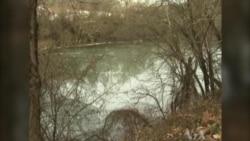For the fifth consecutive day, 300,000 residents in and around the U.S. city of Charleston, West Virginia, have been left without access to clean water, after a chemical spill contaminated the Elk River. Schools and businesses remain closed as a result of the spill, which has stained the area’s water blue-green and made it smell like licorice.
Officials have no timeline for when the water will be safe to use, but West Virginia Governor Earl Ray Tomblin said Sunday the clean-up effort has been positive and an end to the crisis is in sight.
"Our team has been diligent in testing samples from throughout the affected area. The numbers look good, and like last night, they are very encouraging. I believe that we are at a point where we can say that we see light at the end of the tunnel. I ask all West Virginians to continue to be patient as we work to safely restore service to the affected areas,” said Tomblin.
State officials warned residents not to use tap water for anything other than flushing toilets.
"We have a baby and so we are trying to find water for him for formula. It really does not matter for us, we are just trying to make sure he has what he needs," said West Virginia resident Beverly Hager.
Freedom Industries is the company responsible for the chemical spill. Twenty-eight thousand liters (7,500) gallons of a foaming agent used in the coal preparation process leaked into the river on January 9. The toxic chemical then traveled downstream from Freedom Industries to a nearby water treatment plant.
Kent Carper, president of the Kanawha County Commission, said, ''The condition of the plant was not good... and the danger was known to the previous owner and the danger was known to the current owner."
"It's kind of a sweet smell, almost. It smells almost like candy," said one woman who is a local resident.
Tap water in the area is now stained blue-green, and smells sickly sweet.
"People were coming in here asking me what that smell was, you know. I said, 'You know, it is licorice," said local business owner Fred Petry.
Schools and many business remain closed, as the Federal Emergency Management Agency and the West Virginia Army National Guard have delivered nearly one million liters of bottled water to the area.
Officials have no timeline for when the water will be safe to use, but West Virginia Governor Earl Ray Tomblin said Sunday the clean-up effort has been positive and an end to the crisis is in sight.
"Our team has been diligent in testing samples from throughout the affected area. The numbers look good, and like last night, they are very encouraging. I believe that we are at a point where we can say that we see light at the end of the tunnel. I ask all West Virginians to continue to be patient as we work to safely restore service to the affected areas,” said Tomblin.
State officials warned residents not to use tap water for anything other than flushing toilets.
"We have a baby and so we are trying to find water for him for formula. It really does not matter for us, we are just trying to make sure he has what he needs," said West Virginia resident Beverly Hager.
Freedom Industries is the company responsible for the chemical spill. Twenty-eight thousand liters (7,500) gallons of a foaming agent used in the coal preparation process leaked into the river on January 9. The toxic chemical then traveled downstream from Freedom Industries to a nearby water treatment plant.
Kent Carper, president of the Kanawha County Commission, said, ''The condition of the plant was not good... and the danger was known to the previous owner and the danger was known to the current owner."
"It's kind of a sweet smell, almost. It smells almost like candy," said one woman who is a local resident.
Tap water in the area is now stained blue-green, and smells sickly sweet.
"People were coming in here asking me what that smell was, you know. I said, 'You know, it is licorice," said local business owner Fred Petry.
Schools and many business remain closed, as the Federal Emergency Management Agency and the West Virginia Army National Guard have delivered nearly one million liters of bottled water to the area.





